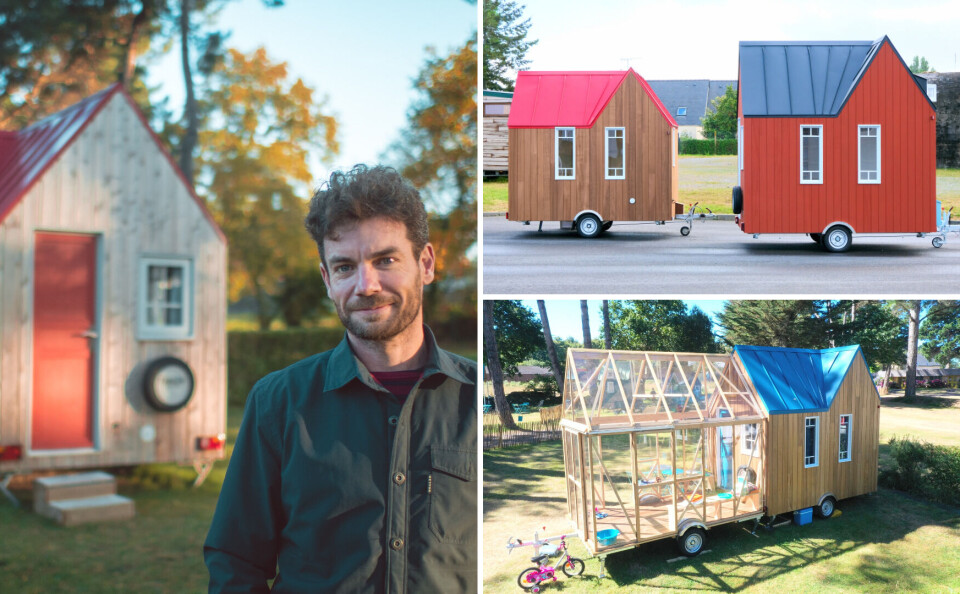-
France’s home renovations grants relaunch: key points to know
MaPrimeRénov’ is once again available to households of all income levels
-
Did you know? These plants are forbidden in French gardens
Invasive species cannot be sold, planted, or exchanged
-
Home insurance increases expected in France after floods
Compensation costs for the recent storms and flooding across the west and south-west is estimated to be in the billions of euros
Tiny homes that can be towed reinvent French caravan concept
The micro properties, which look like scaled-down houses, are built on trailer frames and registered as both a caravan and domicile

A French teacher-turned-carpenter has taken the ‘tiny house’ concept a step further and is building them on trailer frames so they can be towed as caravans.
The idea has proved so popular that Thomas Longhi now makes around 20 of the house caravans a year, and has a waiting list of two years for his builds, called Cahutes.
“Every Cahute on wheels that leaves us is fully registered as a caravan in France, as well as a domicile, which is important as it confirms it is somewhere people can live if they want to,” said Mr Longhi.
For years, you could not officially live in a caravan in France, which caused difficulties for travellers and other groups because, without a domicile, children could not be accepted into state schools, for example,” he said.
The law changed in 2014, as long as the caravan meets safety and security standards.
Mobile classroom
Mr Longhi started his professional career as a teacher in the French state system, but instead of being attached to a school, his classroom was a converted van in which he taught primary school to traveller children.
“I did not know that the ‘caravan culture’ and information I gained would later be so useful,” he said.
In his early 30s, he resigned and moved to Italy, where he trained as a carpenter, living in Rome for seven years.
He subsequently moved back to France and set up Cahute at Dinard, near Saint Malo, in Ille-et-Vilaine.
‘More ecological’
Cahutes lack the streamlined curves of plastic or aluminium caravans, but can still be towed at speeds of 90km/h.
“With a caravan, you are always making compromises between looks, towing ability, speed and size.
“We have gone down the road of building caravans that fit into the countryside and are more ecological than the traditional plastic and foam-insulated ones people are used to seeing,” Mr Longhi said.
“When towing, you have to be more aware of side winds than with a normal caravan, and look out for low branches, but it is not difficult.”
Timber frame
The trailer and roof are made of metal, but the rest is built around a wooden frame with wood panelling and cork insulation. Living space is 10.5m² for most models, and they weigh 1.3 tonnes.
Each Cahute can be designed by the buyer, although many choose the ‘standard’ options.
Prices for Cahutes vary, depending on the buyer’s specifications, but most cost between €40,000 and €50,000.
“It is a lot, but it reflects the effort put into not only building but equipping and decorating each Cahute so it is a home. The kitchen equipment and shower, for example, are good quality,” said Mr Longhi.
Towing rules
Most can be towed by drivers with a normal ‘B’ category licence, where the total loaded weight of the car and trailer/caravan does not exceed 3.5 tonnes. This weight can increase to 4.25 tonnes with a B96 licence endorsement (formerly known as the permis remorque), which can be obtained with seven hours of training at a driving school.
Only where caravans are over 3.5 tonnes, which is not the case with Cahutes, is the driving licence BE required, which means passing a practical test with a state examiner.
Read more: Campervan: How strict is France on enforcing maximum loads rules?
The Cahutes are almost always over the 750kg mark, and so must have braking systems and independent number plates, plus regular contrôle technique examinations.
Booming business
Mr Longhi said he is getting so many queries that he is considering setting up a franchise system, where people are trained and licensed by him to build Cahutes.
“We have made a conscious decision to remain a small business and I do not see that changing,” he said.
The company also builds larger, modular homes of around 40m² without wheels, but which can be moved if necessary.
“They are well insulated and can come with off-grid electricity and water systems – an ecological alternative for people wanting to build their own homes,” he said.
“It sometimes transpires that people think they want a Cahute caravan, but when we talk about it properly, one of the larger homes suits better.”
Related articles
Micro-maison tiny houses catching on in France
Truck or home? Clampdown on converted vans in French tourist spots
Are we allowed to leave our caravan parked on our land in France?
























